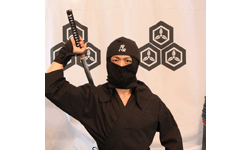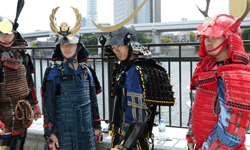
English | Japanese

English | Japanese



Samurai, literally meaning “people who serve” was originally the servants of government officials who were dispatched from the capital to rural communities during Heian period (the 8th – 12th). They later became warriors specializing
in the martial arts, especially Japanese fencing. The samurai warriors were supposed to hold loyalty, courage and honor. Eventually some went on to become influential in politics since the 12th through 19th centuries. Their social
position was classified as the top rank until the Meiji restoration (1868).
Unlike Samurai, Ninja, literally meaning “people who endure or brave out”, was a secret agent or spy in feudal Japan. It is said that the functions
of the ninja included espionage, sabotage, infiltration, assassination and guerrilla warfare.
In the Sengoku period (the Age of Provincial Wars in the 15th - 17th centuries), hiring of mercenaries and spies by Samurai
became active in the Iga Province (current Mie prefecture) and the adjacent area around the village of Kōga (current Shiga prefecture). The area's clans were much of our knowledge of the ninja. Tokugawa Shogunate Government (17th
– 19th) seemed to fully utilize the Ninja to govern the local feudal lords.
By the time of the Meiji Restoration, the tradition of the Ninja had become a topic of popular imagination and mystery in Japan. Ninja were
associated with legendary abilities such as invisibility, walking on water and control over the natural elements. Whether or not it was true, the Ninja looks something to be admired as the one having strong physical, mental and
technical ability.